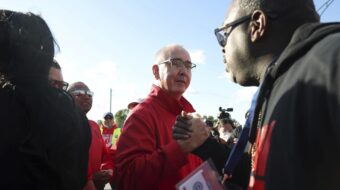WASHINGTON (PAI)–Workers, economists and scholars told the Senate Labor Committee on March 10 that increasing unionization, by making forming unions easier, would help all workers — union and non-union — in a time of economic distress, as the Employee Free Choice Act was formally introduced.
The testimony at the panel hearing, and a follow-up press conference by Sen. Tom Harkin (D-Iowa) and House Education and Labor Committee Chairman George Miller (D-Calif.) came as unionists fanned out to more than 100 cities nationwide for mass rallies urging public support for the law, organized labor’s #1 priority in this Congress.
Meanwhile, in the hearing room, Harkin and other Democrats gave the law a sympathetic hearing, repeatedly emphasizing that it would amend the National Labor Relations Act to give workers — not bosses — the right to either elect unions to represent them in workplaces or to have automatic legal recognition of the union at a worksite once a verified majority of workers signs union authorization cards.
The GOP launched a second assault on the proposal. Republican senators repeated their anti-union diatribes about “the secret ballot” and complained the nation has more important issues to tackle.
They also hired an economic consultant from the “free market” University of Chicago school of economics to say that increasing unionization would increase unemployment.
Harkin admitted business’ $200 million-$300 million ad campaign against the law produced some wavering Democrats, but is confident of 60 Senate votes to stop a GOP filibuster against the measure. He said it might be tweaked, while not compromising its basic principles, to achieve that majority. The Senate will consider the law first, Miller said. It has 223 House sponsors, including 3 GOPers, plus 40 Democratic senators.
Let’s lower the thermostat a little” on hot rhetoric against the law, Harkin said.
The law is designed to help level the playing field between workers and bosses by legalizing majority signup, which Harkin noted at the press conference was the preferred union recognition method in of the National Labor Relations Act, signed in 1935. The law has been eroded, by the 1947 GOP revisions — the Taft-Hartley Act — and National Labor Relations Board and court rulings since then, he added.
All this would not matter so much if there wasn’t a direct correlation between the growth of the middle class, the growth of unions after World War II and the growth in productivity, witnesses said. But that link was broken, Harkin said, and since then productivity has grown while wages have lagged, then went into reverse over the last eight years. Meanwhile, union density in private industry is down to 7.6 percent.
The witnesses took turns describing the current state of the economy and how their individual unions helped them — including one from SEIU Local 32B-J in New York — who told lawmakers his union and its employers helped place displaced janitors in new jobs to replace ones lost when the Twin Towers collapsed in the Sept. 11, 2001 attack.
Sharon Harrison, a Communications Workers member who works at an AT&T Mobility center in far Southwestern Virginia — an area that is both poor and majority-Republican — led the witnesses, describing the difference at her company before and after AT&T bought it and it was unionized under a majority signup agreement between the union and the company.
“Before we had our union, favoritism was a problem. Raises didn’t depend upon your job performance but upon whether your manager liked you. The same was true for job security and even when someone was a top performer, he or she could be told, like I was, that ‘I can get rid of you for any reason, for anything, at any time,” Harrison said.
But when Cingular Wireless — now AT&T Mobility — bought the call center in 2005 and had a company neutrality pact with CWA, everything changed, she said. The anti-union campaign stopped, she noted. Such campaigns elsewhere feature illegal harassment, spying, firings and plant closure threats. The company pledged a new attitude towards its workers after the majority sign-up succeeded.
Now the union and management work together on workers’ rights, they “have a framework to solve problems, and there’s a way to address critical issues like turnover, training and new technology,” Harrison said. “There’s a clear path to improving our jobs and our work and that’s important to AT&T Mobility and very important to us,” given the lack of well-paying jobs in places like southwestern Virginia.
Harrison and hundreds of other workers — from other unions including electrical (IBEW) and food and commercial workers (UFCW) — fanned out over Capitol Hill to take that message to lawmakers the same day, the start of an intense lobbying effort.
That’s what Trisha Miechur, an SEIU member and organizer in its drive at the Manor Care nursing home in Easton, Pa., told one key swing vote, Sen. Arlen Specter, R-Pa.
He’s a past supporter of the law who has been silent. “We contacted SEIU because we were short-staffed and our administration” at the nursing home “didn’t help.”
When the union started its drive, the company charged Miechur with being “disloyal” and threatened to fire her, which is illegal. If the law passes, Miechur and her fellow workers at Manor Care “will be equal, not scared,” she adds.












Comments